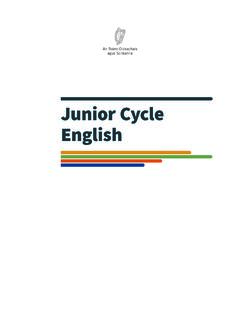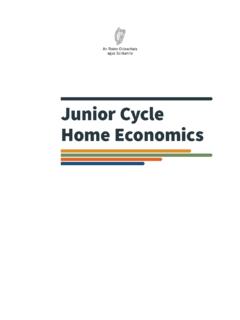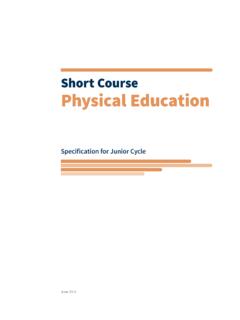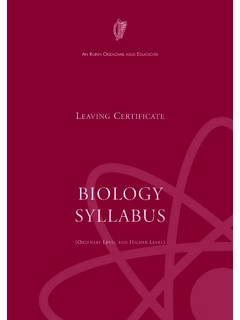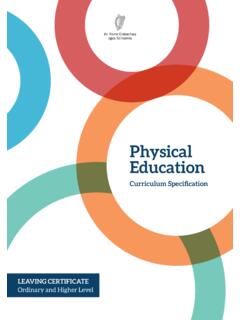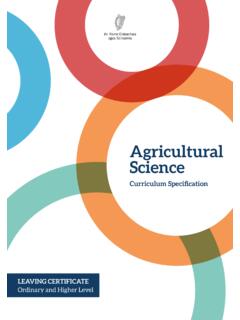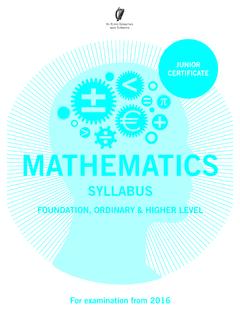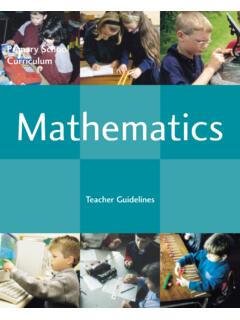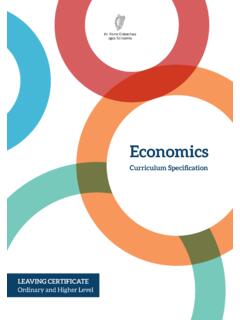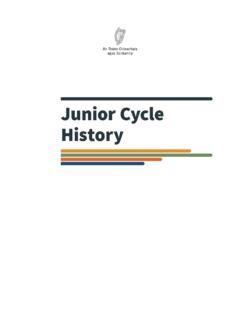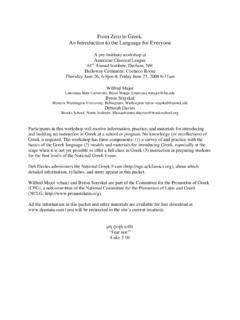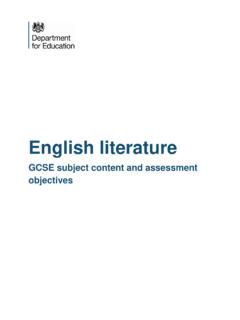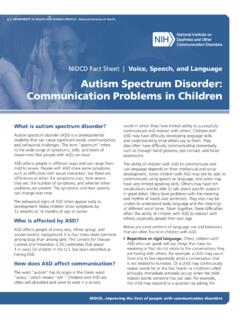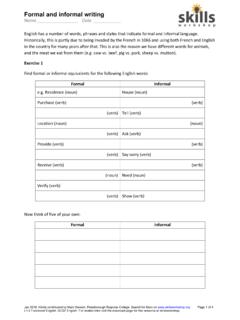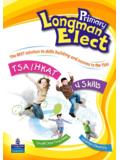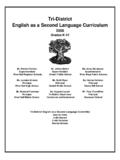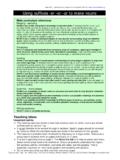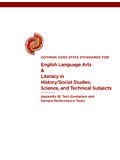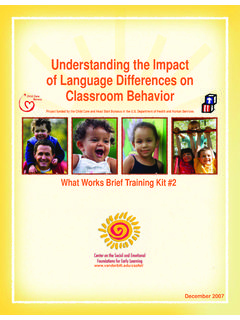Transcription of The Writing Workshop - Curriculum
1 Primardevelopmentsfor is sa bhunscola Why a Writing Workshop ?For all writers, young and old, Writing is a complex process. It involves tasks/stages during which the writer chooses topics to write about, plans ideas, translates ideas into a first draft, and reviews what has been written. Children need repeated, explicit demonstrations of the processes involved in Writing , with plenty of opportunities to practise and experiment. Planning for and teaching the process, craft and mechanical aspects of Writing is essential for children to develop into independent, self-regulated writers who can easily draw on needed information from long-term memory. Communicating to children that the most important part of Writing is the sharing of their thoughts and ideas and that lower-level skills such as grammar, spelling and punctuation can be dealt with when editing and publishing, can relieve their anxiety and increase children s confidence and sense of self-efficacy.
2 LEARNING OUTCOMESC hildren develop concepts, dispositions and skills in relation to: Engagement Motivation and choice Conventions of print and sentence structure Spelling vocabulary Purpose, genre and voice Writing process Response and author s intentPRIMARY LANGUAGE Curriculum ENGLISH Because writers are continually planning and revising as they write, researchers recommend a process approach to the teaching of Writing . This approach views Writing as a set of behaviours which can be taught, learned, discussed and developed. It emphasises the importance of thinking, inquiring, imagining, creating, communicating and exploring language through Writing and gives equal attention to processes of Writing and the written product. The Writing Workshop is an instructional framework which teachers can use to support children as Writing Workshop1 Support MaterialENGLISH | Writing | Stage 1 and Stage 2 Children sharing their thoughts and ideas is the most important part of Writing ; lower-level skills such as grammar, spelling and punctuation can be dealt with when editing and LANGUAGE Curriculum ENGLISH primardevelopmentsfor is sa bhunscola During the Writing Workshop children learn how to be real writers and they are viewed as real writers.
3 Teachers explicitly teach children how to work and learn actively as writers, through providing daily meaningful, authentic opportunities to write within a routine-driven, predictable learning environment. As Writing is primarily a social activity, teachers scaffold children s learning and provide opportunities for children to listen and respond to each other daily. When a Workshop approach is used, the creative and aesthetic dimensions of Writing are fostered and motivation is enhanced as children have choice and control over Writing topics. It provides opportunities for the authentic integration of oral language, reading, fluency and vocabulary . Children begin to see reading and Writing as reciprocal processes as they adopt the stance of the writer and then the need lots of experience with shared and interactive Writing and shared reading before moving on to the Writing FOR THE Writing Workshop TO FLOURISH Provide sufficient time for Writing daily.
4 Give children choice of topic and opportunities to write in a range of genre. Emphasise the development of children s voice and creativity in their Writing . Provide opportunities for social interaction including an audience and response to children s Writing through daily conferences and share sessions. Provide opportunities for children to learn the processes, craft and skills of Writing through tailored daily mini-lessons. Use the Gradual Release of Responsibility Model and other appropriate teaching methodologies. Use quality literature to demonstrate Writing techniques. Create a safe, highly-organised, routine-driven, predictable learning environment. Focus on content and Writing as communication first and foremost; encourage approximate spelling in the case of young writers. Assess Writing using checklists, rubrics and portfolios in order to plan mini-lessons on the craft, skills and processes of Writing .
5 See also: NCCA (2006) Assessment in the Primary School Curriculum . Hold high expectations for children s Writing Workshop2 Support MaterialENGLISH | Writing | Stage 1 and Stage 2 PRIMARY LANGUAGE Curriculum ENGLISH primardevelopmentsfor is sa bhunscola Getting Started with Shared and Interactive Writing Shared WritingIn shared Writing , the children choose what they would like to write about (the topic) and the teacher acts as their scribe. First they discuss the topic and then they work together to develop the Writing . The teacher recordsthe children s Writing ideas on a chart or interactive screen by modelling aspects of the Writing process such as:Interactive Writing The teacher and children share the pen. Children are invited to come up and write on the chart or interactive whiteboard, , particular words or sounds that they are familiar with and can spell.
6 Collaborative Writing opportunities with the teacher and other children is an important precursor to the introduction of a Writing 1 concepts of print, , left to right, spaces between words, punctuation approximate spelling of unfamiliar words by segmenting syllables, stretching sounds and matching letters to phonemes (a phoneme is the smallest unit of sound in a word) how to use the word wall for high-frequency words how to combine ideas and elaborate on them how to add description and build context. The Writing WorkshopIn interactive Writing , the teacher and children both act as the MaterialENGLISH | Writing | Stage 1 and Stage 2 PRIMARY LANGUAGE Curriculum ENGLISH primardevelopmentsfor is sa bhunscola Transitioning to Writing Workshop Children begin to write their own stories independently when they have experienced shared and interactive Writing , have a knowledge of some letter-sound relationships and an understanding that the written word is a communicative act.
7 In daily mini-lessons, teachers think aloud and model how to: choose topics of personal significance and brainstorm ideas draw ideas and then label elements of the picture write sentences related to the picture discuss ideas with an audience add to and refine ideas consider word choice and select interesting and apt vocabulary spell by segmenting sounds in words use environmental print in the classroom as a spelling aid. All children can make meaning on the page by mark-making/drawing and talking about their Writing . Some will also be able to label elements of their drawings and others will be able to take it further and attempt to write and Assessing for Learning Regular assessment of children s Writing using checklists, conferences and rubrics can help teachers determine children s progression with Writing , in line with the Progression Continuum for Writing in the Primary Language Curriculum .
8 Children should also be encouraged to self- and peer-assess, using appropriate child- and teacher-designed rubrics and checklists. This information can then feed into planning for differentiated instruction and scaffolding towards the next stage of development. Children move through predictable stages of development in spelling, which increases their capacity to produce more complex text. Keeping samples of children s Writing in a portfolio provides a record of progress over Writing WorkshopRegular assessment from conferences, rubrics and portfolios feeds into mini-lesson planning and MaterialENGLISH | Writing | Stage 1 and Stage 2 PRIMARY LANGUAGE Curriculum ENGLISH primardevelopmentsfor is sa bhunscola place when a group of children demonstrate a need for a specific skill or craft. Small-group lessons are based on the teacher s notes and assessment records.
9 While the teacher conducts small-group lessons with a targeted group of children, the children not involved in the small-group continue to work independently on their Writing from the previous day or begin a new piece. The teacher will conference with 3-4 of these children after the small-group lesson concludes. Daily mini-lessons play a critical role in assisting children in enhancing the quality of their Writing and in discovering their own voice. Structure of the Writing Workshop1. The Mini-Lesson (approx. 10 mins.)Video 2 Video 3 The Writing Workshop begins with a mini-lesson. A mini-lesson is a short lesson focused on one aspect of Writing in which the teacher provides explicit instruction using a think-aloud. The mini-lesson is often linked to high-quality children s literature or a piece of the child s own Writing .
10 Whole-class mini-lessons take place when all children, or the majority, need explicit instruction with one specific craft, convention, process or organisational technique. Small-group mini-lessons take The Writing WorkshopThe Writing Workshop has three parts: (1) a mini-lesson (2) independent Writing and conferencing (3) a share sessionIn a mini-lesson, the teacher provides explicit instruction on one specific craft, convention, process or organisational technique involved in MaterialENGLISH | Writing | Stage 1 and Stage 2 PRIMARY LANGUAGE Curriculum ENGLISH primardevelopmentsfor is sa bhunscola TYPES OF MINI-LESSONSM anagement and organisation (when necessary):Teaching the routine of the Writing Workshop , , the structureof the Writing Workshop , how to use Writing folders, rules forconferences and how to respond within a share (when necessary): Teaching the steps in the Writing process, , choosing a topic, drafting, revising, editing and (1-2 times a week).
